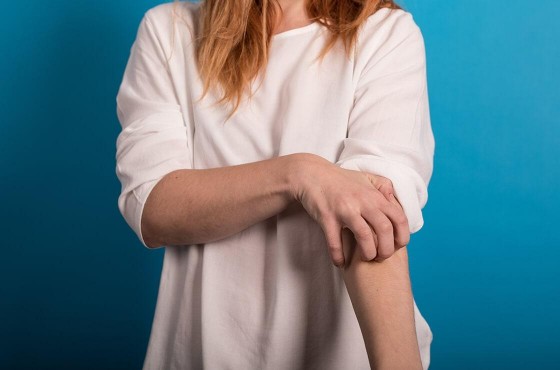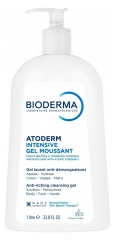Atopic skin:
how can it be treated?
Written by Paul Musset, Doctor in Pharmacy | published on | updated on 02/04/2020

Atopic dermatitis is a benign inflammatory disease, which makes the skin very dry and sensitive to allergens, subject to eczema flare-ups. Fortunately, with appropriate treatment, symptoms can be significantly reduced.
What is atopic dermatitis?
Atopic dermatitis, also known as atopic eczema, is an inflammatory disease of probably genetic origin. 60 to 80% of the people affected have at least one parent with the condition. It often appears in the first few months of life. The outbreaks generally peak between the ages of three months and five years. That being said, atopic skin remains fragile even in adulthood. Benign in most cases and non-contagious, atopic dermatitis can, however, cause daily discomfort during flare-ups. Indeed, it appears as eczema flare-ups on the face and body, along with severe itching.
People with atopic skin often react strongly to contact with various allergens. Furthermore, children with atopic eczema are more likely than others to later develop another form of allergic reaction, such as asthma or rhinitis.
Atopic skin: A few figures
This condition affects one in five children under the age of three and one in ten adults. It is on the rise in Western countries, where it has doubled in less than 30 years. How can that be explained? Atopic skin is the result of an overreaction of the immune system, which causes inflammation. Perhaps the population is becoming more sensitive due to excessive hygiene, especially in early childhood, but also due to contact with many pollutants and chemicals to which our bodies are not designed to be exposed.
What are the symptoms of atopic skin?
The first signs of atopic skin usually appear in babies around the age of two or three months.
The cheeks, hands, chin and buttocks are the first areas affected. As the child grows older, the red patches extend to the folds behind the knees, to the elbows, etc. The child is itchy and sometimes feels pain due to rubbing on the irritated skin. During eczema flare-ups, the red patches often become covered with small white blisters that sometimes weep and then heal, forming scabs, before the skin peels off and renews itself. Over time, if flare-ups are frequent, the skin can become thicker and rough. Finally, after a few years, other allergic symptoms – such as asthma, hay fever, hives, etc. – may appear (but not systematically), even if the eczema tends to improve.
What are the factors that trigger eczema flare-ups?
Patients’ atopic skin is overly sensitive and reactive. Contact with allergenic or irritant substances can trigger an inflammatory reaction in these people, who produce too many antibodies called Immunoglobulin E. These substances can be chemicals (cleaning products or pool chlorine), animal hair or clothing made of wool or silk, plants (grass in particular, but also essential oils), some metals such as nickel, or simply mechanically irritating substances such as sand.
Anything that causes perspiration can also promote the appearance of redness: synthetic fabrics or fabric that is too tight, rooms that are heated too warmly and poorly ventilated, etc. And, on the other hand, what dries out the skin is also a risk factor: wind, sun, prolonged baths, hard water or cosmetic products that are too astringent.
Good daily habits to reduce symptoms
Many simple everyday actions can greatly reduce the frequency and severity of atopic eczema flare-ups. These actions mainly consist of avoiding all contact between the skin and irritating and allergenic substances as much as possible.
Hygiene
It all starts with cleansing. Choose products without soap, fragrance or dyes and pigments, and prefer quick showers to baths. If your water is too hard, it may be worth installing a water softener. Babies can hardly be expected to give up the great pleasure of baths, but care must be taken not to extend it beyond ten minutes.
Clothes
Choose cotton clothing rather than clothing made from nylon or other synthetic fabrics, which stimulate perspiration, or animal fibres, which can trigger allergies. Avoid drying your laundry outdoors during pollen season. Putting on a t-shirt sprinkled with pollen may be enough to trigger an allergic reaction in sensitive people, whether it is sneezing, crying eyes or a skin reaction.
Medical treatments
In some cases, it is necessary to resort to medical treatments to treat atopic eczema. Indeed, atopic skin is inherently fragile. Over time, it becomes more permeable and can no longer properly perform its function as a protective barrier. As a result, it is easier for microbes and other allergens to pass through.
- Dermocorticoids are creams and ointments that can be applied to the lesions. The duration and frequency of application must be observed to avoid side effects.
- Another local treatment is the application of immunomodulators, but their long-term toxicity has not yet been assessed.
- Oral antihistamines and corticosteroids are most effective for other allergic symptoms such as asthma or rhinitis and should not be prescribed only for eczema.
- UV phototherapy and oral immunosuppressants are reserved for the most severe cases.
- Antibiotics are only used if the lesions have become infected.
What about spa treatments?
Surveys conducted in several spa centres approved for dermatological treatments show genuine effectiveness for people suffering from atopic eczema. The properties of the water are only one of the reasons, the other factors being the accompanying treatments, learning the right actions, as well as the contact and exchanges with others who have the same affliction.
Hypoallergenic natural products for taking care of atopic skin
When you are prone to atopic eczema, it is essential to take care of your skin on a daily basis and not only during flare-ups. Hydration is essential, with neutral products, without dyes and pigments, without fragrance, rich in emollient and moisturising active ingredients, such as the products in the Topicrem DA range. Once or twice a day, the carefully chosen creams should be applied generously to the entire body.
Cocooncenter offers you a whole range of special treatment products for atopic skin, as well as other soap-free, fragrance-free, hypoallergenic cosmetics that will minimise the risk of provoking a reaction from your sensitive skin.
Having atopic skin requires taking certain precautions and devoting a little time to daily care. That said, people with atopic skin have one advantage: They are much less prone to minor acne problems than people with other types of skin!
The key points to remember about atopic skin:
- Contrary to what is often said, eczema flare-ups are not a disease of psychological origin. However, stressful periods can lead to flare-ups.
- Many problems can be avoided by moisturising the entire surface of the body of children and adults every day of the year with gentle products specifically designed for atopic skin.
- Cotton clothing, natural skin care products, regular ventilation: these healthy habits will benefit the entire family, whether or not they have atopic skin.























